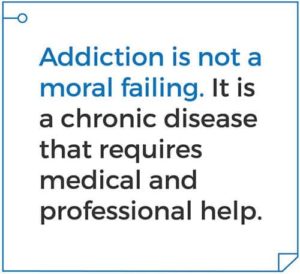- Jul 11
- AddictionDrug Addiction TreatmentTreatment
For centuries, society viewed addiction as a moral failing. People with substance use disorders were told they did not have the desire or willpower to quit. In fact, some people still do not believe that addiction is a disease.
Addiction, however, is not a moral failing. It is a chronic disease that often requires medical and personalized addiction treatment programs. Much like other diseases, addiction can destroy relationships with loved ones and it can cause many health and financial problems. Even with the many negative consequences, addiction is hard to break because there is no simple solution or cure.
Addiction is a Disease, and Genetics May Play a Role
While no one decides or chooses to have a substance use disorder, some are more genetically predisposed to addiction than others. Various studies show genetics may have a role in the disease. Studies conducted on twins and adopted children show that 40 to 60% of susceptibility to addiction is hereditary.
Effects of Addiction on the Brain

After an individual uses an addictive substance, dopamine floods the brain’s reward circuit. Dopamine is a chemical messenger that signals pleasure. Once released, the brain begins to associate the substance with a feeling of pleasure. This leads to the individual wanting to use the addictive substance repeatedly to get the same feeling.
Due to the fact that the brain adjusts to excess dopamine, each time an individual uses, he or she requires more of the addictive substance to experience the same amount of pleasure. Individuals develop a tolerance, needing more of the substance to feel the pleasure they once experienced and it becomes difficult to stop using.
Depending on the frequency and amount the individual used, long-term use of drugs and/or alcohol sometimes leads to permanent changes in the brain. The repeated use of drugs and/or alcohol affects functions in the brain like learning, judgment, decision-making and memory.
Withdrawals
After someone stops using, they face withdrawals. Withdrawal can include anxiety, shaking, fatigue and other symptoms. The easiest way to get immediate relief from these symptoms is to use the substance. Wanting a release from withdrawal and/or to temporarily experience the “high” once again, individuals will often use.
Relapse
Since addiction affects learning and memory, people may be in danger of relapsing after seeing a substance they once used. For instance, because of conditioned learning, an individual with alcohol use disorder may see a beer and begin to crave alcohol, even if they haven’t had alcohol in a long time. The hippocampus and amygdala store environmental cues. Even when an individual no longer wants to continue seeking out the source of their pleasure, the brain still associates the source with pleasure and they develop cravings when they are around the substance.
Gateway’s Customized Programs
At Gateway, we strongly believe that addiction is a disease. However, like many other diseases, addiction can be treated and managed. It is important to remember that relapses do occur, but it does not mean that the individual cannot successfully manage their addiction. Having specialized substance abuse treatment programs and seeking out professional help is the best way to start towards a life of sobriety. Attempting to go “cold-turkey” without professional supervision can be dangerous. There are instances of death and other life-threatening occurrences. Seeking out professional help is the safest and most reliable way to begin the journey to recovery.
For more information about Gateway and our rehab center locations in Illinois, contact us today.


